Giants: Citizen Kabuto
PC - Planet Moon, 2000
Giants is one of a clutch of genre-blending games from the dawn of the 3D era, but is this an action RTS for the ages or are we all suffering from the Mandela effect?

QuickLinks
The MeccarynsSea Reapers
Kabuto
Flawed Structure
All Your Base
3-in-1 Value Pack
Style and Humour
Commercial Failure
Giants: Citizen Kabuto was the first game from Planet Moon Studios, a team formed in the late 90s from ex-Shiny developers. Coming off the back of legendary Shiny games like Earthworm Jim and MDK, Planet Moon had the idea for a game where the player would control three different races, each with differing play styles. Describing their new project, they “just wanted to do something original and fun. We're basically making exactly the type of game we want to play”.
Giants was released in 2000, with the unique setting alongside many unique claims, chief among which was the mix of Real Time Strategy (RTS) elements into its third-person shooting. But you wouldn’t notice this when you start playing the game.
The single-player campaign consists of three very distinct sections across a single story.
The Meccaryns
The Meccs are a group of British young lads who like beer and women, and that’s really all you need to know about them. They kick off the story, and you’re introduced to the Smarties, a race of big headed aliens native to the planet the Meccs have landed on.
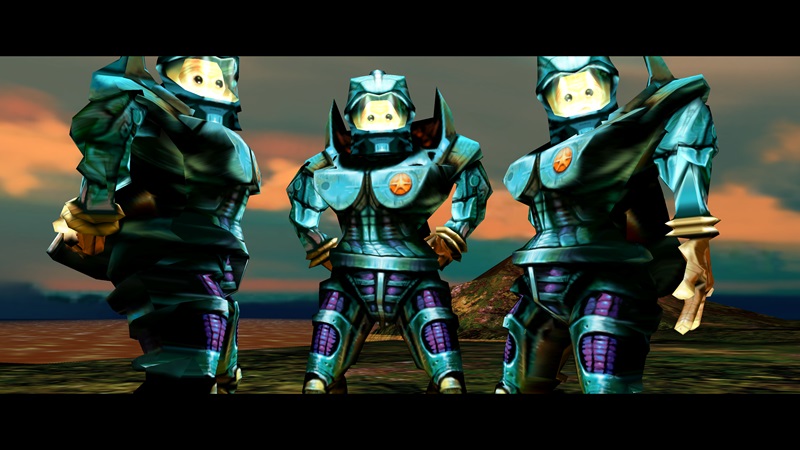
These chaps have sci-fi guns, space suits, and most notably, a jetpack. The game starts out very slow, with drawn out tutorial missions involving lots of walking with basic guns and abilities. Movement is still fun, with just enough juice in your pack to jump around hilltops before you have to let it recharge for a few seconds. You can sort of ‘ski’ around as in Tribes (Dynamix, 1998) the OG of PC gaming jetpacks. Indeed, Planet Moon consulted with the Tribes 2 lead developer. Later the jetpack, as with the rest of your gear, gets upgraded and you become steadily more powerful.
Your team also gets upgraded. As you rescue your friends throughout the story missions they join your squad, following you and firing at anything you shoot at or attacking or defending what you ask them to. Their AI met with some derision, but squad games such as Rainbow Six (Red Storm, 1998) and SWAT 3 (Sierra, 1999) received similar criticisms. FPS squad shooter Star Wars: Republic Commando (LucasArts, 2005) had similar complaints and wouldn’t come out until 2005 so I had no problem with the squad AI in Giants.
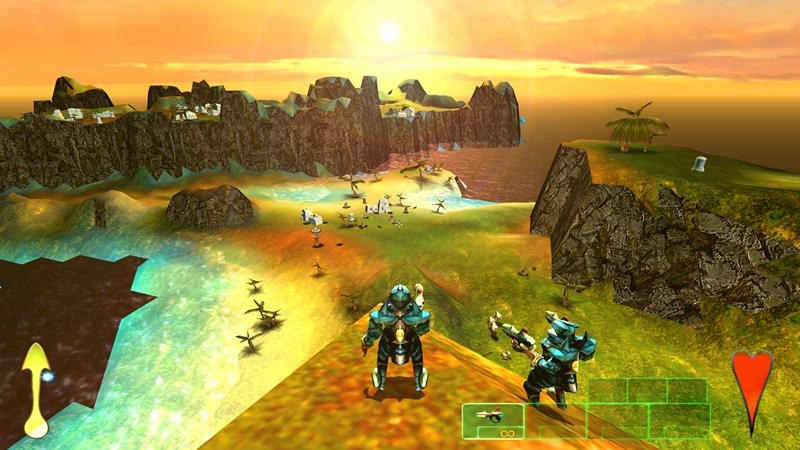
As you unlock more guns, items and upgrade your gear alongside a full squad of team-mates, you are finally introduced to the RTS part of the game. In these specific missions you are able to enter a menu and choose which buildings you want to build. You don’t construct these yourselves, so you must find and enlist the help of the local Smarties as your labour. Smarties need food in order to work, so you also need to track down some local wildlife, Vimps, and collect their meat. Meanwhile the enemy are attacking your base, and so begins a balance between defending your home and or striking out across the level to collect your resources.
It’s actually the best mission of the game in my opinion and does a great job of balancing your tasks to keep you on edge. You are also free to explore the island and gather resources from different areas as you need. It feels very dynamic. Unfortunately I would barely describe this as RTS, perhaps some kind of limited tower defence would be more accurate, but more on that later.

As you complete this great finale, with a kitted-out base, all the guns and items and a full squad at your disposal, you are then unceremoniously dumped into Act 2, with a brand new under-powered player character and a whole load more tutorial missions to push through.
Sea Reapers
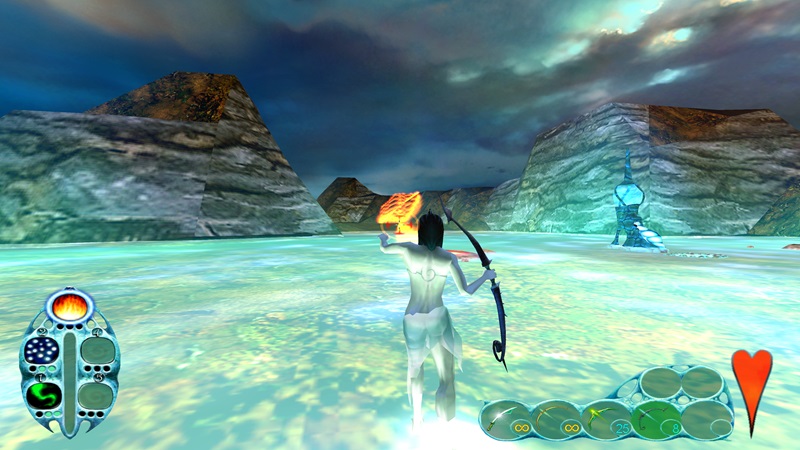
Act 2 sees you play as Delphi, the naked (if you were in Europe) or bikini-wearing (if you were in the US) Sea Reaper. Delphi is slow on land to start with, but a fast swimmer. Indeed the Meccs will be killed by piranhas if they go in the water, so act 2 has you thinking differently already. You can swim around areas to get to your objective if you want, skipping some sections entirely. Delphi has no jetpack, no squad and no guns. Instead she has a bow and arrow and an MMO-style hotbar with various magic spells to cast. The style and character would have been a change of pace, but the fact you are essentially starting a new campaign with more slow tutorial levels is very jarring. You are again underpowered with no gear, slowly making your way across the landscape. As a player it feels very frustrating, like a cliche game level where you are imprisoned and all your weapons are taken away. Only instead of breaking out and getting them back you have to start the whole game over.
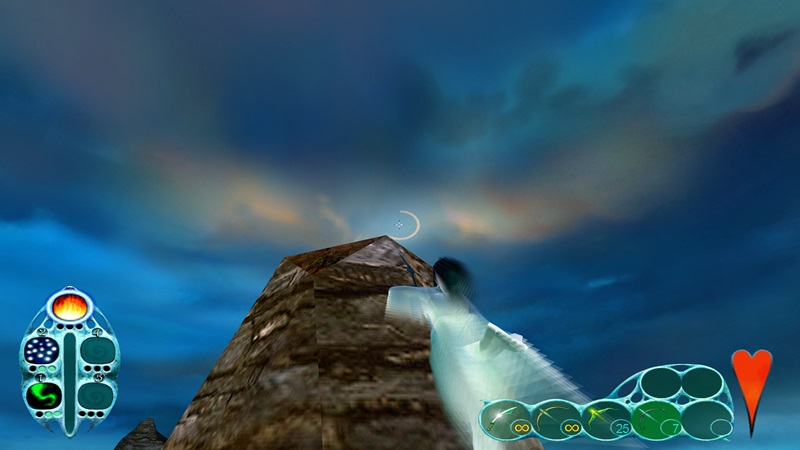
You are slowly re-introduced to the RTS elements again, there are more in Delphi’s campaign than the Meccs, but the Meccs are still there in the story and cutscenes. The quirky humour however now feels out of place, with Delphi being a more serious fantasy character with proper stakes in the story, slightly at odds with the irreverent tone.
There is an then an inexplicable break for four frustrating jet-ski racing levels in a row. No-one knows why. Then after the finale, again it's back to square one.
Kabuto
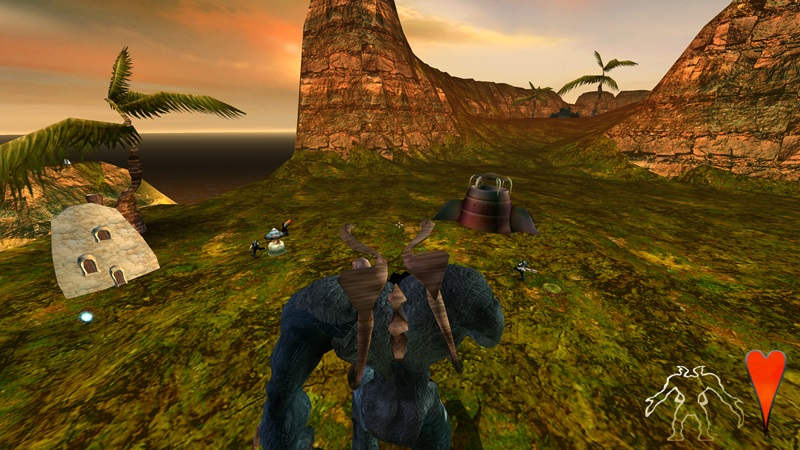
As you take control of the giant through the canyon corridors for more tutorial levels, any semblance of an open world is now gone. There are no more RTS levels or any interesting mechanics. You are simply a small giant(!) who stomps around and eats people to get bigger. It is fun to be a giant with a different perspective in the world in which you were previously normal sized. After all, that's also part of the attraction of being third or first person in an RTS base. The novelty wears off quickly though; there is nothing to engage the player, just walk round the very linear levels, eating, punching or stamping on people. Later they introduce a mechanic of laying eggs and controlling your baby giants, but it’s not very interesting and worse, now it’s just getting in the way of any simple Hulk fantasy fun you were having.
It felt a bit like mech stomper Slave Zero (Infogrames, 1999) but after all the trinkets of the Meccs and the RTS heavy Delphi missions it’s a bit of a shallow third act.
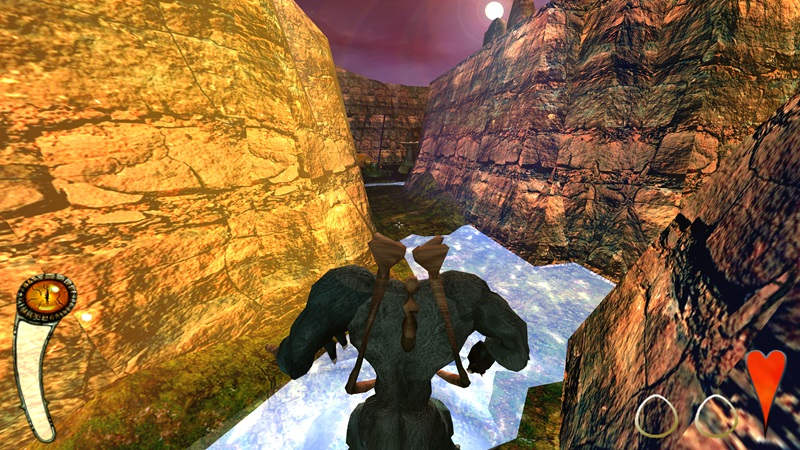
Flawed Structure
The Meccs are by far the most fun to play, the jetpack and missions allowing you a bit of freedom to explore each level’s island. The open terrain was touted by devs as a selling point but FPS games were no longer corridor-bound by 2000 anyway. Certainly although the levels are largely open islands, most of them still prescribe a linear route through, although you can employ the classic ‘wiggle up the geometry-while-constantly-jumping’ technique of yore, before Breath of the Wild (Nintendo, 2017) allowed you to climb everything. Even where the levels are open, the missions are still linear.
It’s a real shame. I think that the giant was the conceptual punchline here, with special wrestling moves and a roar button for Kabuto, on top of your standard chomp and smash buttons. But as a game, the Meccs were much more enjoyable and interesting to play, and the three acts are in reverse order, getting simpler and less engaging each time.
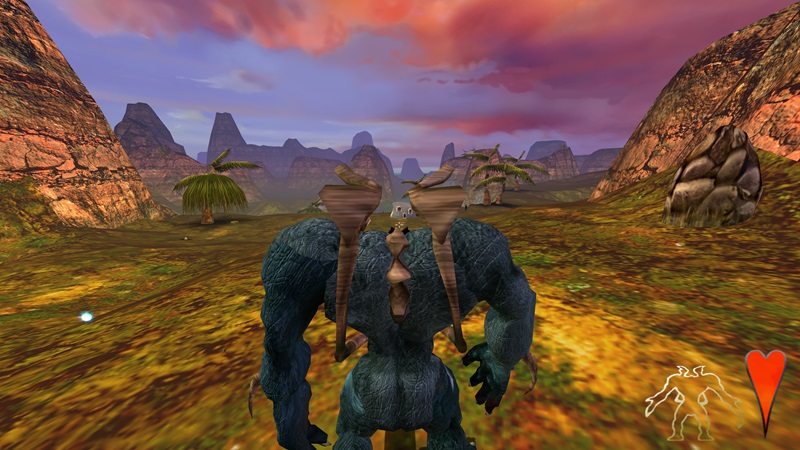
And going from big finales to being low powered in a new species and having to do more tutorials is a real bummer each time. Psychologically speaking perhaps even just unlocking the next campaign and going to the menu to choose it would have been less frustrating from the player's point of view.
All Your Base
The base building is very rudimentary, to the point where I wondered if I was misremembering Giants from my youth. It’s not blended into the gameplay; you can only build a base during an RTS level, and only at a specific location. Choose buildings from a menu and they are built on a pre-ordained spot. Then go and collect resources to complete the buildings, come back and repair and defend your base as needed.
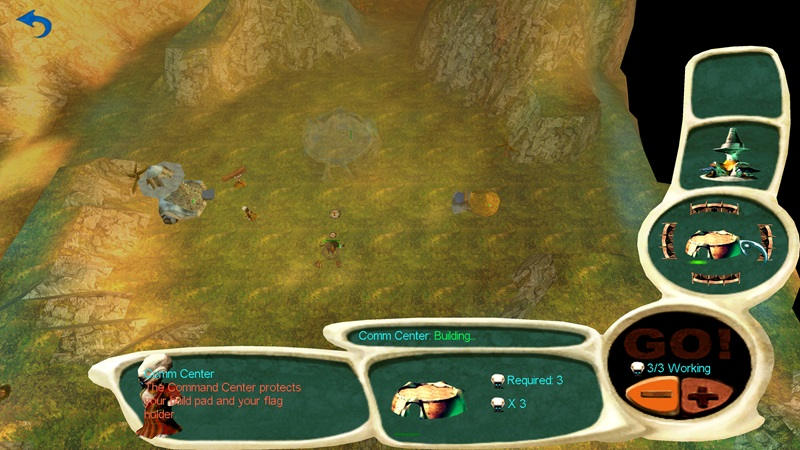
As mentioned in the Meccs section, the balance between going out for resources and staying back to defend is well done, and you also have to decide whether to leave your friends at home to defend, or come with you to face the gradually increasing amounts of enemies around the level.
Building walls around the base also help you build momentum in the mission, and you can also unlock turrets to help in this regard. It’s more engaging than the shooting sections which are a little mediocre, but nothing like the advertised RTS. There is no real strategy to speak of, no units to create or control, and you have little or no say in which order to build your buidlings.
Compare this with Battlezone (Activision, 1998), about which I admit I am biased; it is one of my favourite games and still in rotation today. Battlezone is literally what is claims: an RTS from a first person perspective. Freely placeable buildings, create units and defences, group units and send them on missions, define your own strategy to win however you want, with the tools at your disposal. In Battlezone your fingers will be dancing around the hotkeys in no time, creating what you need and commanding your troops while simultaneously riding your chosen tank into battle. It does not even compare to the prescribed base building menu in Giants.
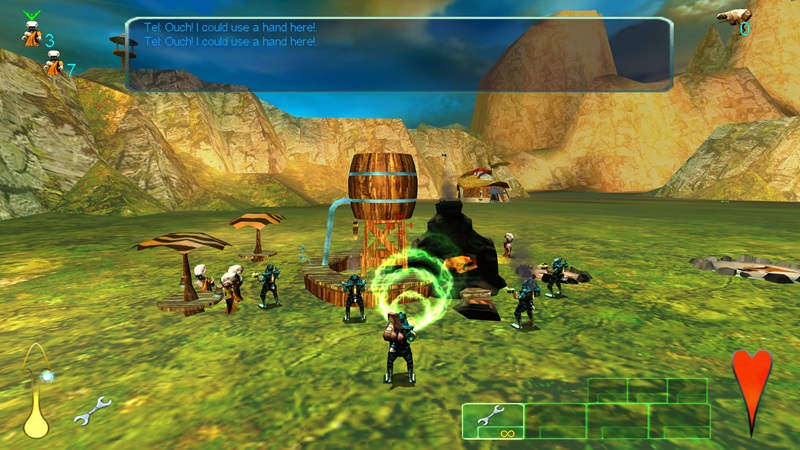
Planet Moon uses the terms 'RTS' and 'strategy', although there are really neither of those things. Indeed, the messaging was a bit confusing, the promotional material from Planet Moon’s now defunct website states “Giants is the first game ever to pitch the forces of all popular genres in the most frenzied and diverse multiplayer battle ever staged.”
And more official material via dedicated fan-site Giants World Domination: “Giants is a revolutionary new style of action game combining RTS elements like base building and resource management in a simple and easy to understand way that has never been seen before. The game requires strategic thinking to exploit the enemies' weaknesses and manipulate your opponents against one another for control.”
Meawhile on the pre-release interview circuit there was a different story. Planet Moon Design Director Bob Stevenson says:
“it's an action game with a hint of strategy, with a multiplayer side and a story-based single player side. But it's primarily an action game. I mean I think that early on in the game since we were describing some strategy elements that people tended to think that it was 50/50 strategy and action, but it's definitely more action.”

This was common refrain, with the devs focusing more on the story, action and having fun. However, going back to read previews and reviews of the time, the RTS aspect received the most hype, which is baffling to me given the recent action RTS games of the time.
Despite the marketing material, I don’t really blame Giants or Planet Moon for this failed expectation, but reading recent comments and user reviews it seems like players still find this to be a core aspect of the game despite being so limited, and only in perhaps 20% of the missions. Maybe they aren’t aware of other similar games of the time, although I find it more likely they are recounting from memory and are experiencing some sort of gaming Mandela effect like I myself did. Or maybe they just love Giants and its limited base building, and that’s ok too, it can be a charming game. Or rather, it can be charming games.
3-in-1 Value Pack
There are essentially three separate games here, not as different as something like Spore (Maxis, 2008), but different enough to feel distinct. On top of that you have the very separate shooting and RTS levels, and the jet ski racing levels. The squad management, the different species to play, the asymmetric multiplayer. It feels like one of those more aged variety games like Star Wars: Rebel Assault II (Lucasarts, 1995) where each level is a different genre.
I don't think any of the ideas were done first and I don’t really think any were done best either, but the ‘kitchen sink’ approach described by Bob Stevenson certainly added fun to what would have been an average shooter.
Sadly the quality of any individual level type is generally not as good as any of its more genre-focused peers. The claim of merging "all popular genres" is ultimately its downfall. For me, Giants a Jack of all trades and master of none.
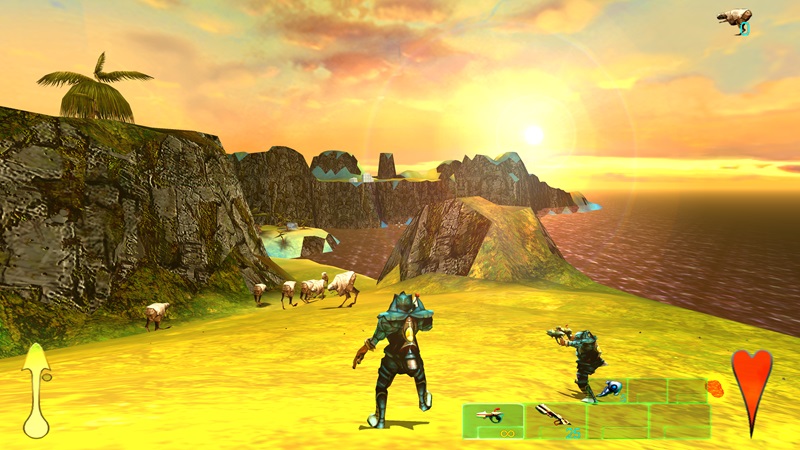
There are a few other frustrations. The lack of save games was much decried at the time, although the later Playstation 2 version did receive mid-mission saves. Progress does seem to be saved at some points in the longer RTS missions though, which is a godsend. The shooting is standard constant blasting, although there are headshots when using the sniper rifle. Because there’s no saving, you will often find it necessary to slowly snipe from a huge distance to avoid danger, and the MDK-style sniper’s zoom is usable with any gun, not just the sniper rifle. You'd think this would be a bonus but, especially in earlier levels, sniping long range with your inaccurate pistol because you don't want to restart the whole level is not very fun.
There are a lot of fun details throughout though, which show how much heart has gone into the game. Characters have fun idle animations. Instead of disappearing, bugs appear and eat the dead enemies. The herds of Vimps used as a food resource move around in a group, and if killed will eventually respawn as babies and grow to full size. I remember being amazed at this as a kid, as if they were real herd of animals. There are lots of little details like the first-person optional view for Kabuto being from inside his mouth. In interviews Planet Moon often states that they simply throw in all the fun ideas they have, and although I think that's detrimental to the game overall with so many different types of gameplay, it really shows in a positive way for these little details.

The enemy AI is not bad, enemies charge towards you, burrow underground, shoot stuff at you, although nothing some standard noughties circle strafing can't deal with. There is a lot of destructible scenery which is interesting for the time, and enemies will hide behind objects only for you to destroy their cover (and they do likewise to you). Some of the creature designs are fun, an occasional Sonak, a big mammoth enemy, will sing and stamp its feet to make waves in the terrain, just like the Thumper weapon in Battlezone, which was a delight.
The spells and items are fun, like the bush camouflage that feels straight out of Metal Gear Solid, or Delphi’s huge tornado spell.
Taken on its own, the music is also lovely, by Jeremy Soule of Skyrim soundtrack fame and Mark Morgan of Fallout 1 and 2. Mark Snow of X-Files theme tune fame was allegedly attached initially as well. The nice orchestral score however doesn’t really fit the quirky toilet humour tone of the game.
The graphics were great for their time and praised in many reviews. Fancy reflections are already evident on the menu screen, and state-of-the-art effects like bump mapping and ambient lighting made for a stunning PC game. Playing it 25 years later, the art style helps make up for the polygonal objects and characters, and the skyboxes in particular are still gorgeous today. There was enough lens flare to compete with Incoming (Rage, 1998) which was essentially a graphics showcase bundled with every graphics card. Indeed, Giants itself was later bundled with graphics cards to show off their abilities.
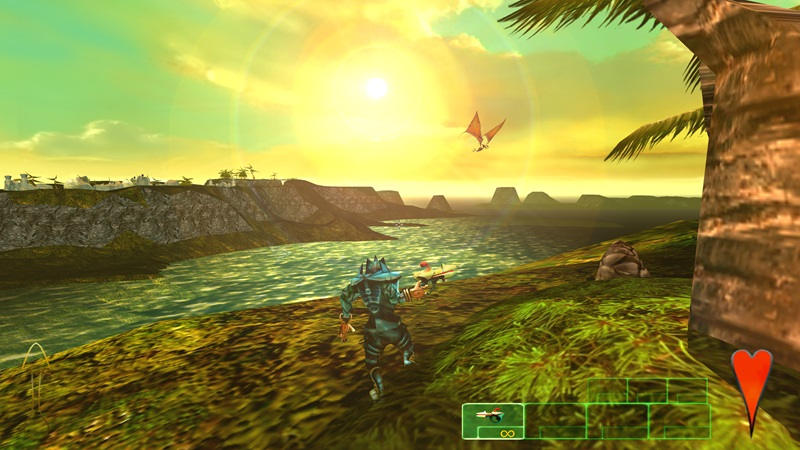
Style and Humour
Giants evokes MDK as soon as you load the first level, with the same grimy but cartoony art style and a slightly silly and baudy tone which Americans call ‘British humour’. That sense of humour was most quoted as reason enough to play the game, which may have been true 24 years ago.
Undoubtedly the voice acting is great, and the story is obviously something the devs care about a lot, the manual even has a fictional lore of the Planet Moon studio itself. But much of the humour is very dated now. It is silly and fun, but often veers a bit towards the juvenile, even the manual has some dick jokes in it.
The humour is not mean-spirited or deliberately edgy like Grand Theft Auto (DMA, 1997), and the devs seem like nice people. I myself remember finding the game hilarious when I first played it as a teenager. My feeling is it’s just very much “of its time”, and like most things from 25 years ago, some of it doesn't hold up well today.
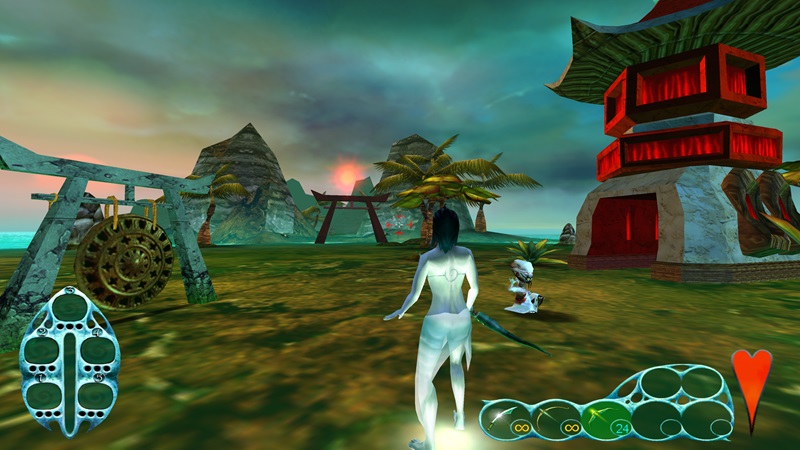
Aside from the regional British stereotypes, you will meet such characters as Asian Racial Stereotype Martial Arts Master, replete with twirly moustache and generic South-East Asian accent. Although he does occasionally affect a stereotypical Indian accent as well, in case any Indian players felt left out. One of the first missions meanwhile has a Smartie forgetting that his wife was kidnapped, only wanting her rescued so that she can cook him dinner. Upon her return he doesn’t seem to mind she cheated on him with a Mecc, and then hits her and tells her to start cooking. This is sometimes waved away as satire by fans, but I don’t really see anything deeper here. The Meccs are always chasing women, including two of the three female characters in the game, the Smartie wife and the player character of Delphi.
Speaking of Delphi, Tim Williams, Creative Director of Planet Moon, was describing how they came up with the idea of Giants in an interview:
“I know it sounds simple but we just wanted to do something original and fun. We're basically making exactly the type of game we want to play, replete with 100 foot Giants, beautiful topless women, a team of cockney spacemen, and you're whole hodgepodge of cds, gyroscopes, magnets and lasers!”.
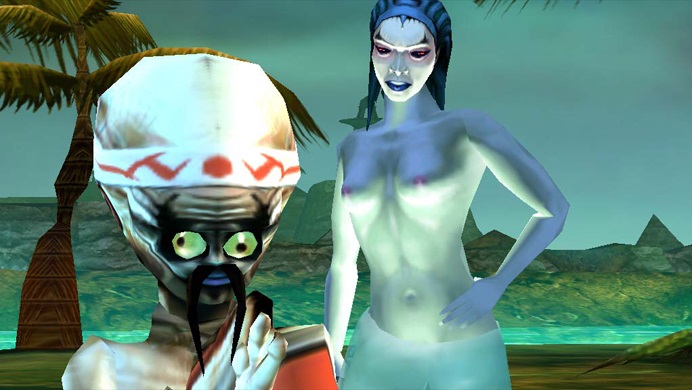
The dev team wanted topless women, so in they go! Delphi is indeed naked, however in the US they added a bikini to stop it from getting an ‘M’ rating and limiting their audience. For any women playing Giantsit was probably no worse than most other videogames in 2000 which isn't to say that's a good thing. Delphi's character is not bad in this respect, although the fact she is an attractive naked love interest of one of the Meccs is part of the story. Again it's very much of its time, although interestingly the sexualisation of women in games allegedly peaked in 1995 so Giants was slightly behind the curve here.
Ironically, their attitude towards their female characters may have impacted the success of the game and ultimately the studio. Wal-Mart refused to sell Giants because of the nudity, and the last minute bikini patch to censor it didn’t appease the retail giant.
Commercial Failure
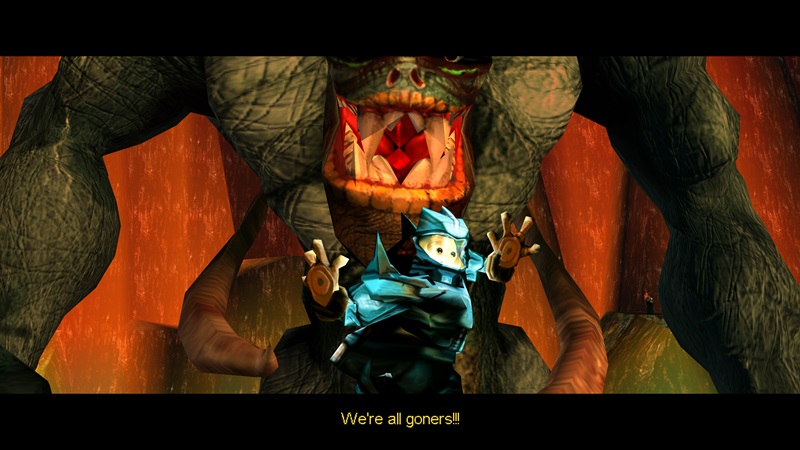
Wal-Mart refusing to stock the game was surely a financial hit to Giants, but I would guess that there were other contributing factors. There was a protracted development, partly due to health issues on the dev team but also because Planet Moon developed their own 3D engine. This was not unheard of at the time but was a big commitment for a small team, especially when aiming for cutting edge graphics. Giants stood out from the more grimdark and serious shooters of the era, but despite glowing reviews, and state-of-the-art graphics, it didn’t sell well.
There is still a contingent today who love Giants and the asymmetric multiplayer, and good on them. It’s another interesting novelty that was again perhaps inspired by RTS games with different multiplayer factions. I do love unique games and this does break away from the norm, but in retrospect its not as unique or groundbreaking as other games the pantheon, even from the same year of release.
Upon launch, Giants had a decent level of hype in the gaming press owing to its pedigree and the many unusual elements added to the idea of a standard third-person shooter. It also reviewed well, praised for its myriad back-of-the-box features as well as its humour and graphics.
At this time the RTS genre was still going strong with Red Alert 2 (Westwood, 2000) also released in 2000 and Ground Control (Massive, 2000), a new 3D RTS franchise also releasing that year, so the RTS element would have worked in its favour.
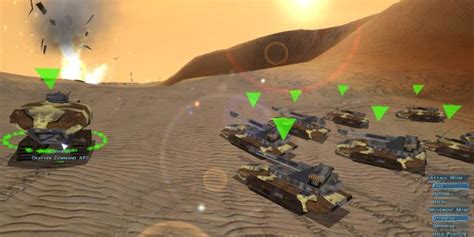
Shooter-wise 2000 was mostly First-Person Shooters (FPS) on the PC, but they had begun to evolve. In the same year Giants was released, Quake 3 Arena (id, 1999) spearheaded a multiplayer-first design, while Thief 2 (Looking Glass, 2000) and Deus Ex (Ion Storm, 2000) expanded FPSes into the immersive sim.
However, there was one notable third-person shooter in 2000. For lovers of Shiny’s style of art and humour, MDK2 (Bioware, 2000) was already on the shelves. MDK was Planet Moon founder Nick Bruty's baby, and now it's sequel would be going up against his new game. MDK2 was outsourced however, because Shiny were busy developing their own new game. That game, Sacrifice, was billed as a unique mix between two genres. You guessed it, third-person action and RTS. It was released a month before Giants.

Sacrifice leaned more heavily into hybrid gameplay style rather than separate sections for different genres. It was hyped in the press even more than Giants, and on the surface had an even more convincing pedigree, coming from Shiny itself. The art style was very distinct and the irreverent tone was also there, as well as some celebrity voice backing for the characters. It reviewed even better than Giants, and although it also was not a commercial success it won many awards and plaudits. It also had some genuinely innovative ideas such as mouse gesture controls a year before Black and White did the same (Lionhead, 2001).
And if that wasn’t enough, Sacrifice wasn't the only option out there. Uprising was an FPS/RTS, or Action RTS, game that was released in 1997 and the sequel in 1998, alongside our old friend Battlezone.
If you’re looking at ads and reviews for an action RTS in the year 2000, I would wager Giants would be a contender due to its many claims and marketable characters, but ultimately it doesn’t stand up well against its peers.
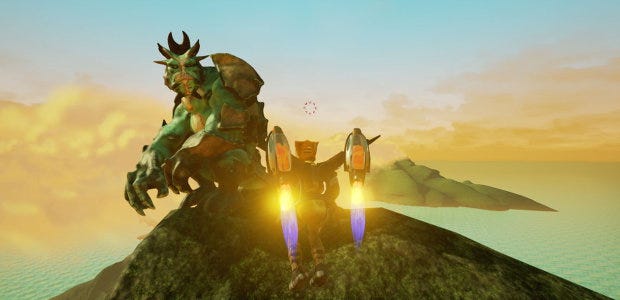
The developers themselves admit that they were devs first and marketers second (as it should be, in my opinion). They also consider this partially at least behind the failure of a Kickstarter for First Wonder, a spiritual successor to Giants from 2015. Perhaps that was also a factor in the mixed messaging in Giants’ marketing.
Planet Moon’s next game was Armed & Dangerous, published not by Interplay but by Lucasarts, but again it failed to do well commercially.
Planet Moon pivoted to smaller handheld games and was eventually shuttered in 2011. Nick Buty attributes some of this to the move away from smaller risk-taking publishers of the 90s and on to larger AAA, risk-averse publishers not willing to take a chance on smaller studios with unusual ideas.
Most gamers who lived through that period would agree, which probably explains the nostalgia for this fertile period in gaming history, a time when a novel and humorous style of game could still be mainstream, before years of increasingly bland AAA games.
Indeed Shiny Entertainment didn’t fare much better, being sold off in 2002 and downsized. While they too had some beloved and inventive games such as Messiah (Shiny, 2000) and the aforementioned Sacrifice held in high regard much like Giants, neither Shiny nor Planet Moon could duplicate the success of MDK.

All game posts:
© P7uen 2024 | Base style css by EGGRAMEN 2020